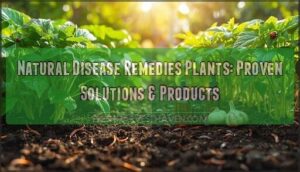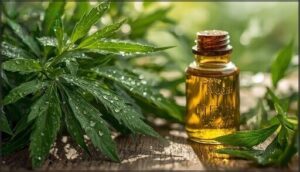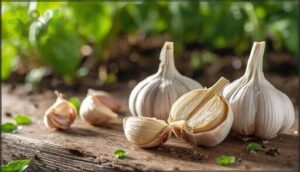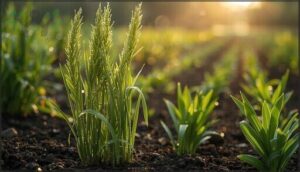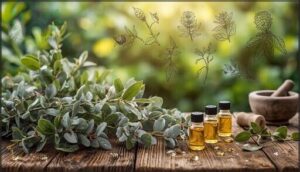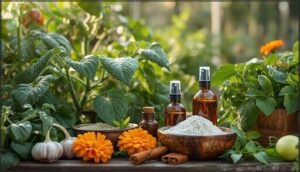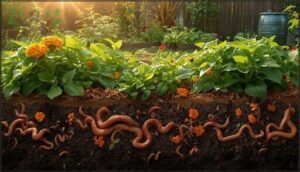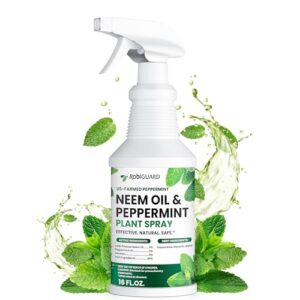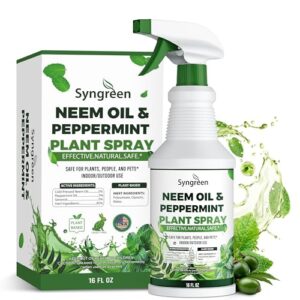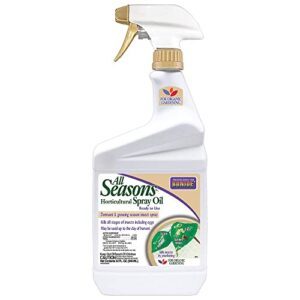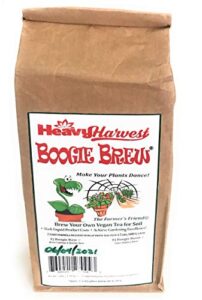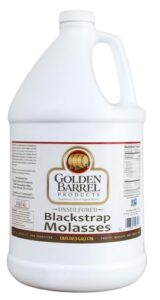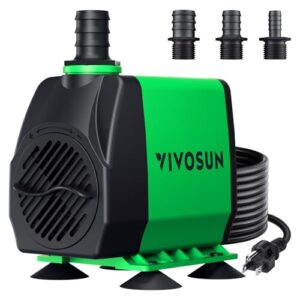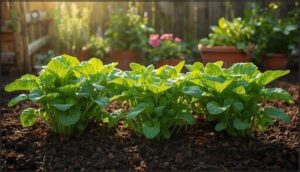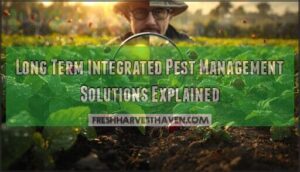This site is supported by our readers. We may earn a commission, at no cost to you, if you purchase through links.
Your garden plants send distress signals long before visible damage appears—wilting leaves, stunted growth, mysterious spots spreading overnight. While commercial fungicides promise quick fixes, they often leave behind chemical residues that harm beneficial insects, disrupt soil ecosystems, and accumulate in the very food you’re trying to grow.
Natural disease remedies offer a smarter alternative, combining antifungal and antibacterial properties that protect your garden without poisoning the ground beneath it. From neem oil’s proven track record against powdery mildew to garlic extract’s powerful bactericidal action, plant-based treatments work with your garden’s existing defenses rather than overwhelming them.
The key lies in understanding which remedies target specific diseases, how to apply them effectively, and which prevention strategies keep pathogens from gaining a foothold in the first place.
Table Of Contents
- Key Takeaways
- Essential Plants for Natural Disease Remedies
- Proven Plant-Based Disease Remedies
- Eco-Friendly Practices to Prevent Plant Diseases
- Top 6 Products for Plant Disease Remedies
- Tips for Sustainable and Organic Plant Health
- Frequently Asked Questions (FAQs)
- How to cure plant disease naturally?
- What are some natural healing plants?
- How do natural remedies impact beneficial insects?
- Are there natural treatments for viral plant diseases?
- What are alternatives to garlic for bacterial control?
- Can natural remedies prevent post-harvest spoilage?
- How to naturally treat soil-borne nematodes?
- How often should natural fungicides be applied?
- Can homemade remedies harm beneficial soil organisms?
- Which natural treatments work best for seedlings?
- Conclusion
Key Takeaways
- Neem, garlic, horsetail, chamomile, and eucalyptus are powerhouse plants for fighting garden diseases naturally and boosting plant immunity.
- Homemade remedies like neem oil spray, garlic extract, baking soda, apple cider vinegar, and milk offer effective, eco-friendly options for managing fungal and bacterial threats.
- Preventing disease is easier when you rotate crops, use companion planting, prune for airflow, and invite beneficial insects into your garden.
- Sustainable plant health depends on composting, smart watering, choosing disease-resistant varieties, and careful timing of natural treatments.
Essential Plants for Natural Disease Remedies
You don’t need a pharmacy when nature offers powerful plant allies that have protected gardens for centuries.
These five plants stand out for their proven ability to fight off diseases, strengthen plant immunity, and keep your garden thriving without harsh chemicals.
Let’s look at each one and how it can transform your approach to plant health.
Neem (Azadirachta Indica)
Neem (Azadirachta indica) stands as your frontline defender against fungal disease control and bacterial pathogens. This ecofriendly powerhouse contains azadirachtin and other limonoids that naturally shut down infections in your crops.
Neem oil benefits extend beyond simple pest management—it’s one of the most reliable natural remedies for plant diseases. The neem tree’s insecticidal properties make neem oil spray essential for organic gardeners seeking proven protection.
Effective use of clear science information is vital in understanding the benefits of neem oil.
Garlic (Allium Sativum)
Building on neem’s strength, garlic (Allium sativum) delivers powerful allicin benefits that tackle fungal control and bacterial threats head-on. When you crush fresh cloves, allicin activates—an organic pesticide with proven antimicrobial properties. Your garlic spray naturally tackles plant disease prevention:
- Reduces soft rot and bacterial speck in tomatoes
- Suppresses bacterial wilt in susceptible crops
- Inhibits Fusarium fungal growth
- Provides natural pest control with repeated applications.
For effective disease management, it’s vital to examine research methodology approaches.
Horsetail (Equisetum Arvense)
Where garlic stops, horsetail (Equisetum arvense) steps in with mineral-rich firepower. Its silica benefits strengthen cell walls, giving you natural disease resistance against leaf spots and mildews.
Horsetail extracts deliver fungal inhibitors through phenolic compounds—plant mineralization at work.
Studies show modest improvements in organic gardening methods when you combine these sprays with compost teas, supporting vigorous plant health management through natural fungicides you can trust.
Chamomile (Matricaria Chamomilla)
Gentle yet powerful, chamomile (Matricaria chamomilla) brings antifungal properties that stop Botrytis cinerea and damping-off in their tracks. Chamomile benefits include bisabolol and chamazulene—compounds proven in lab assays to inhibit fungal growth.
Brew chamomile tea as a natural fungicide spray, or plant it nearby to lower humidity and boost plant immunity. These herbal remedies fit perfectly into organic gardening methods, offering gardening tips and tricks that protect without harsh chemicals.
Eucalyptus (Eucalyptus Globulus)
Terpene benefits shine through eucalyptus oil (Eucalyptus globulus), which fights powdery mildews and other plant diseases with proven antifungal power.
Essential oils derived from eucalyptus work as natural remedies for fungal control in organic gardening, though you’ll need careful dilution to avoid leaf burn.
These plant immunity boosters improve garden disease prevention when you combine low-concentration sprays with smart cultural practices.
Proven Plant-Based Disease Remedies
You don’t need to reach for synthetic chemicals when your plants start showing signs of trouble. Nature offers powerful remedies that work with your garden’s ecosystem rather than against it.
Here are five proven plant-based solutions you can make at home to tackle common fungal and bacterial diseases.
Neem Oil Spray for Fungal and Bacterial Diseases
You can block fungal spore germination and bacterial infections with neem oil spray, a cornerstone of organic gardening and plant disease management.
Mix 0.5–2% neem oil with mild soap, then apply every 7–14 days for effective fungal disease control.
This natural pesticide smothers pathogens while boosting plant immunity, offering proven relief from powdery mildew and bacterial infections without harsh chemicals.
Garlic Extract as a Natural Bactericide
When bacterial soft rot or leaf spot threatens your garden, reach for allicin-rich garlic extract—nature’s sharp-edged defense. This potent natural bactericide reduces bacterial diseases at 2–4% dilutions, especially when you apply it early.
Its antimicrobial properties boost plant immunity while offering fungal resistance too. Time applications during cool mornings for best results, though sensitive crops may react to its pungent sulfur compounds.
Baking Soda Spray Against Powdery Mildew
That stubborn white dust coating your leaves? Baking soda spray creates an alkaline barrier that stops powdery mildew cold. Mix 1–2 tablespoons per gallon with a surfactant for better coverage, then apply every 7–10 days—especially after rain.
This natural fungicide works best on mild infections, though overapplication can stress leaf tissue, so watch your dilution carefully.
Apple Cider Vinegar for Fungal Control
Apple cider vinegar’s natural acidity disrupts fungal cell membranes, making it a gentle organic fungicide for plant health. Keep concentrations at 1–2% to prevent leaf burn, and apply this vinegar spray every 7–10 days during early infection stages.
- Works best as preventive treatment rather than cure-all
- Effectiveness varies by fungal diseases and plant species
- Repeated foliar applications required for measurable results
- Test on sensitive ornamentals before widespread use
Milk Spray for Disease Prevention
You’ll find milk spray acting like an invisible shield for your plants, triggering natural immunity responses that keep foliar diseases at bay.
Mix it at 10–40% dilution with water, then coat leaves thoroughly every 7–10 days for sustainable gardening practices that strengthen plant defenses.
This organic gardening staple won’t replace chemical fungicides, but it’s proven prevention when applied early.
Eco-Friendly Practices to Prevent Plant Diseases
Prevention beats treatment every time, and that’s especially true for plant diseases. You don’t need harsh chemicals to keep your garden healthy—smart, eco-friendly practices work just as well, if not better.
Prevention beats treatment in plant disease management, and smart eco-friendly practices work just as well as harsh chemicals
Let’s look at four proven approaches that build natural defenses right into your growing system.
Crop Rotation and Soil Health Management
Crop rotation and soil health management form the backbone of disease suppression in your garden. When you alternate plant families across seasons, you disrupt pathogen cycles while boosting soil microbes that protect your crops. Here’s how rotation planning transforms your soil:
- Improve nutrient cycling by rotating heavy feeders with nitrogen-fixing legumes
- Build crop diversity to foster beneficial microbial communities
- Apply organic amendments between rotations to strengthen disease resistance
These sustainable gardening practices create resilient soil ecosystems that naturally combat plant diseases.
Companion Planting for Disease Resistance
Strategic plant pairings work like neighborhood watch systems—aromatic herbs mask vulnerable crops while ground covers reduce leaf wetness that invites fungal diseases.
You’ll boost disease suppression by timing succession planting to disrupt pathogen cycles and arranging companions for better airflow.
Just watch for allelopathy effects; some plants release compounds that harm their neighbors, undermining your natural remedies and sustainable gardening goals.
Pruning and Proper Spacing Techniques
After your companions are in place, you’ll need pruning tools and a plan for airflow management. Thinning cuts open dense canopies, while proper spatial planning keeps mature plants from overlapping.
Remove diseased branches during dry spells to prevent cross-contamination, and space varieties according to their full-grown width so sunlight penetrates and foliage dries quickly, safeguarding your garden ecosystem naturally.
Beneficial Insects and Microbial Biopesticides
Once airflow is sorted, you can invite nature’s pest managers into your garden. Ladybugs and lacewings hunt down aphids that spread disease, while microbial biopesticides work behind the scenes to suppress pathogens.
To employ these allies effectively:
- Release beneficial insects when pest populations first appear, targeting insect life cycles
- Apply Bacillus thuringiensis or neem oil during humid conditions for best biopesticide modes
- Rotate microbial management strategies with compost tea and garlic extract to maintain ecological balance
This layered pest management approach protects your plants without harsh chemicals.
Top 6 Products for Plant Disease Remedies
Sometimes the best natural remedies need a little help from proven products that make application easier and results more consistent. Whether you’re mixing your own neem oil spray or brewing compost tea, having the right tools and ingredients on hand saves time and boosts effectiveness.
Here are six reliable products that support your plant health routine without compromising your commitment to natural, eco-friendly care.
1. Neem Oil Plant Spray
Ever wondered how a single spray can flip the script on stubborn plant diseases? Neem Oil Plant Spray is your botanical shield—packed with cold-pressed neem and a dash of peppermint for vitality and scent.
This ecofriendly gardening solution combats fungal disease control, bugs, and mildew, all while leaving your leaves naturally glossy.
When you’re crafting plant spray recipes for organic gardening tips, Neem Oil’s benefits stand out: it disrupts pests, blocks pathogens, and doubles as a gentle botanical pesticide for natural pest management.
- Cold-pressed neem oil with azadirachtin effectively tackles powdery mildew, early blight, and pests while being safe for organic gardening
- Dual-action formula controls diseases and bugs while adding a natural shine to leaves, plus the peppermint oil makes it smell way better than typical neem sprays
- Eco-friendly and low-toxicity for pets, people, and beneficial insects like ladybugs when used as directed
- Needs careful application timing (early morning or evening) and proper dilution to avoid leaf burn or droopiness, especially on sensitive plants
- Some users report the 16oz bottle is small for the price, and the sprayer mechanism can malfunction or spit oil unevenly
- Won’t work for every pest or plant type, and results vary—a few customers saw their plants struggle or die despite following instructions
2. Syngreen Neem Oil Plant Spray
You’ll appreciate Syngreen Neem Oil Plant Spray when you need a straightforward solution that brings together azadirachtin-based pest control with natural fungicides under one label. This organic gardening tips favorite controls plant diseases and bugs while staying gentle on fruits, vegetables, and ornamentals.
Apply it preventively or at first signs of trouble for ecofriendly gardening solutions that actually work. Dilute according to package directions, and remember that proper spacing helps neem oil benefits shine—overuse can stress sensitive foliage. It’s natural pest control with eco friendly sprays that respect your garden’s rhythm.
- Contains azadirachtin for proven pest control plus natural antifungal properties
- Safe for organic gardening and approved for use on fruits, vegetables, and ornamental plants
- Works preventively or at first signs of trouble, giving you flexibility in timing
- Can yellow or blacken leaves if overused or applied incorrectly
- Too harsh for delicate plants like succulents
- Requires careful dilution and application—spray soil and undergrowth rather than directly on foliage
3. Bonide Horticultural Spray Oil
Bonide Horticultural Spray Oil delivers refined mineral oil that smothers aphids, mealybugs, and spider mites while tackling powdery mildew and leaf spot—a dual-action tool for garden pest control.
You can spray it year-round on fruit trees, roses, and vegetables, embracing organic gardening tips that honor ecofriendly gardening solutions. Follow spray application methods carefully to avoid leaf burn on sensitive crops like cucumbers.
It’s a natural remedies ally when you’re managing horticultural disease without harsh chemicals, blending spray oil benefits with practical horticulture wisdom.
- Works as a two-in-one product that kills common pests like aphids and spider mites while preventing diseases like powdery mildew and leaf spot
- Safe for organic gardening and can be applied throughout the growing season or as a dormant spray
- Versatile enough to use on a wide range of plants including fruit trees, roses, vegetables, and ornamental shrubs
- Can burn or damage sensitive plants like cucumbers and tomatoes if not applied carefully
- Requires multiple applications to see results and won’t provide instant pest elimination
- Needs precise timing and weather conditions to work effectively without causing overspray damage
4. Boogie Brew Compost Tea Solution
Think of Boogie Brew Compost Tea Solution as the secret handshake between soil and plant health. This “living tea” brings Compost Tea Benefits by boosting Microbial Balance, making your garden ecosystem more resilient against disease.
Easy to brew, it acts like probiotics for your soil, enhancing nutrient uptake and supporting Sustainable Gardening. You’ll notice stronger roots, shinier leaves, and richer flavors—without relying on harsh chemicals.
For anyone passionate about Organic Gardening Techniques, it’s a practical, natural remedy that elevates Soil Health and overall Plant Health.
- Creates a living microbial community that improves nutrient uptake and helps plants resist disease naturally
- Easy to use—just mix one cup of ingredients with 5 gallons of water, and you get 50 gallons of tea from a 3lb package
- Works as both a soil drench and foliar spray, giving you flexibility in how you apply it to different plants
- Requires extra equipment like a strong air pump and chlorine-free water to brew properly, adding setup hassle
- Hard to measure actual results without side-by-side testing, so you’re relying on visible plant changes over time
- Needs regular application to maintain benefits, which means ongoing effort rather than a one-and-done solution
5. Golden Barrel Blackstrap Molasses
Golden Barrel Blackstrap Molasses is a surprising and adaptable natural remedy for plant diseases. Made in Pennsylvania with no sulfur or preservatives, it serves as both a soil amendment and a foliar treatment.
You’ll dilute it carefully, then apply it to boost microbial activity and support nutrient cycling. This sugar solution fuels beneficial microbes, strengthening your plants against fungal threats. It’s a cornerstone of organic gardening techniques and natural fungicide methods.
Just remember to keep concentrations low to avoid unwanted fungal growth.
- Feeds beneficial soil microbes with natural carbon sources, improving nutrient cycling and plant vigor
- Made without sulfur or preservatives, making it safe for organic gardening practices
- Long shelf life of 3 years means you can stock up without worrying about spoilage
- Requires careful dilution to avoid fungal growth or stressing plants with too much sugar
- May contain trace amounts of lead and acrylamide, which could be a concern for edible gardens
- Strong, bitter taste and potential for bottle leakage during shipping based on customer reports
6. Vivosun Submersible Water Pump
You can’t treat plant diseases without reliable water circulation, and the Vivosun Submersible Water Pump delivers just that for hydroponic systems and aquarium water circulation. Its sealed motor and impeller design enable quiet operation while moving up to 800 GPH through your setup.
Regular water pump maintenance—cleaning the intake screen and impeller—prevents clogs that compromise pump performance optimization.
This 24-watt unit accommodates natural remedies like neem oil applications and compost tea brewing, making it an eco-friendly solution that keeps your plant health protocols running smoothly year-round.
- Ultra-quiet operation makes it perfect for indoor setups without the annoying hum of louder pumps.
- Strong 800 GPH flow rate with adjustable settings gives you control over water movement for different applications.
- Energy-efficient 24W design keeps your electricity costs low while running continuously.
- May shut off randomly without warning, which can disrupt your system if you’re not monitoring it.
- Flow rate drops significantly as you increase the lift height, so it’s less effective for taller setups.
- Short power cord limits where you can place it unless you add an extension.
Tips for Sustainable and Organic Plant Health
You’ve seen the remedies and products that work, but long-term plant health comes down to building a foundation that keeps disease from taking hold in the first place.
Smart, sustainable practices don’t just treat problems—they prevent them by strengthening your plants from the ground up.
Here are four essential strategies that’ll help you create a thriving, resilient garden without relying on harsh chemicals.
Composting and Organic Soil Amendments
Building a thriving foundation starts with composting and organic soil amendments—they’re natural remedies that feed soil microbes and boost resilience. Finished compost tea delivers nutrients while supporting beneficial organisms, and incorporating biochar benefits sandy soils by holding moisture.
Green manures, vermicompost, and organic fertilizers offer eco-friendly solutions that strengthen soil health and amendment practices, creating the perfect canvas for organic farming success.
Watering Methods to Reduce Disease Risk
Once your soil is thriving, smart watering schedules protect that investment. Drip irrigation systems deliver moisture to roots without splashing pathogens onto leaves, while mulch benefits include steady soil moisture management and reduced surface splash.
Water early so foliage dries by evening, pair rainwater harvesting with proper spacing for airflow, and you’ll see plant health improve—these gardening tips work as natural remedies alongside crop rotation and soil health practices.
Choosing Disease-Resistant Plant Varieties
When your watering is on point, resistant crop selection takes plant health to the next level. Look for certified seed labels advertising genetic resistance to local threats—tomatoes carrying Fusarium oxysporum defenses, brassicas with downy mildew tolerance, and roses bred for black spot immunity all reduce your need for interventions.
Variety screening and plant breeding have given us these resilient allies, turning disease tolerance into your smartest crop rotation partner.
Safe Application and Timing of Remedies
Once you’ve selected resistant plants, your natural remedies work best when applied at dawn or dusk—direct sun can burn treated foliage.
Application guidelines suggest testing small areas first, then following spray schedules every 7–10 days for neem oil, garlic spray, or copper-based fungicides.
Disease monitoring keeps treatment frequency aligned with actual threats, minimizing environmental impact while hydrogen peroxide and other natural remedies stay effective.
Frequently Asked Questions (FAQs)
How to cure plant disease naturally?
You can cure plant disease naturally by rotating crops, improving air circulation through pruning, applying neem oil or garlic extract preventively, and removing infected tissue early to stop pathogen spread.
What are some natural healing plants?
You’ll find turmeric benefits in reduced inflammation, aloe vera for wound healing, echinacea purpurea for respiratory support, ginger remedies for nausea, and ashwagandha effects on stress—each backed by clinical evidence.
How do natural remedies impact beneficial insects?
Natural remedies like neem oil and garlic extract can disrupt pollinator safety and insect habitat when misapplied.
Timing applications away from bloom periods and integrating companion planting with beneficial microbes protects eco-friendly solutions while maintaining natural pesticides’ effectiveness.
Are there natural treatments for viral plant diseases?
Unfortunately, no proven natural antivirals cure viral diseases in plants. Your best defense relies on prevention—choosing resistant varieties, controlling insect vectors, maintaining clean tools, and removing infected plants immediately to protect healthy ones.
What are alternatives to garlic for bacterial control?
You can reach for cinnamon oil, thyme extract, tea tree, oregano oil, hydrogen peroxide, neem oil, copper-based fungicides, baking soda, or potassium bicarbonate—all show real promise against bacterial plant threats.
Can natural remedies prevent post-harvest spoilage?
While fresh produce walks off the farm looking perfect, post-harvest spoilage tells a different story.
Natural antimicrobials like neem oil and garlic extract show promise as plant-based coatings, though proper crop sanitation and controlled storage remain essential for effective spoilage prevention.
How to naturally treat soil-borne nematodes?
You can suppress soil-borne nematodes through crop rotation, soil solarization, and organic amendments like compost tea.
Biocontrol methods using beneficial microbes, nematode traps, and garlic extract offer eco-friendly solutions that strengthen plant resistance naturally.
How often should natural fungicides be applied?
Think of natural fungicides like a protective umbrella—they wash away with rain.
Reapply every 7 to 14 days, or within 1 to 3 days after heavy rainfall, adjusting for disease pressure and crop needs.
Can homemade remedies harm beneficial soil organisms?
Yes, some homemade remedies can disrupt beneficial bacteria and mycorrhizal fungi when overused. Soaps, oils, and baking soda at high concentrations may harm soil microbe populations, affecting natural remedy risks and organic soil health balance.
Which natural treatments work best for seedlings?
To prevent damping-off, ensure sterilized trays, gentle watering, and good airflow.
Neem oil at 1–2% and chamomile spray, applied weekly, protect young plants.
Balanced nutrients and consistent monitoring help catch problems early.
Conclusion
Think of your garden as a living immune system—when you strengthen it with natural disease remedies plants, you’re building resilience from the ground up. Each neem spray, garlic extract, and companion planting choice creates layers of protection that synthetic chemicals can’t replicate.
You’ve got the knowledge now to recognize early warning signs, apply targeted treatments, and cultivate soil that naturally resists pathogens. Your garden doesn’t need rescue—it needs partnership.
- https://www.sciencedirect.com/science/article/pii/S2949916X23000464
- https://github.com/tugcekonuklar/msc-computer-science-notes/blob/main/research-methods/Home.md
- https://www.ai-literacy.se/research-prompts.html
- https://extension.psu.edu/plant-disease-basics-and-diagnosis
- https://extension.umn.edu/diseases/late-blight

